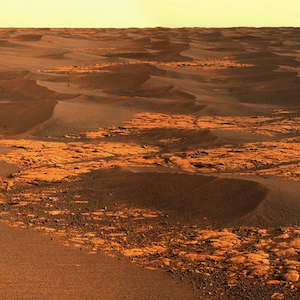
When it gets crowded on Earth this could be some decent real estate!
Here’s a yet another seemingly far fetched piece by yours truly, talking about such things as choosing between the potential destruction of all humanity and evolving endlessly into a god like race. Intrigued?
I’m obviously not the only one to think in such dramatic and marginal terms. In addition to the hordes of nerds entertaining similar thoughts as part of their science fiction entertainment we have Steven Hawkins, that wheelchair scientist that everybody loves, last year telling us yet again to get off this rock or die. Being immobile, stuck to his wheelchair, and talking solely through a computer voice it almost seems as if he is out of this world himself telling us from such a distant perspective what we might not see from within our typical daily lives here on Earth.
What he said is that space colonization is essential to the long term survival of humanity, and I agree. As a math professor in the most important video you will ever see eloquently explained and demonstrated the Earth has a limited carrying capacity, even in terms of something as simple space to occupy.
Yes, if the number of humans continues to grow as it has been recently at some point we will literally not be able to fit on the surface of the Earth. Skyscrapers or underground cities would only postpone the problem somewhat while still making life on Earth a lot less pleasant.
Aside from the issue of overpopulating this planet there is also the issue of risks we take by continuing to wage wars, and develop ever more powerful technologies, not that the two need to exist side by side or feed each other (seriously). Some among us are so mentally unstable they can’t really resist the idea of spending stolen money on large scale warfare powered by crazy war tech, and because of such individuals we continue to risk cataclysms caused by nothing but sheer stupidity of those who can’t control their rage or lust for power (because their parents were mean to them).
Then there is a somewhat more innocuous risk that comes from experimenting with crazy new tech that’s actually useful for empowering everyone, not just disempowering a favorite enemy of the day. Experimenting with nanotechnology? There’s this whole “grey goo” scenario to watch out for. Biotech? Watch out for out of control virii that make swine flu or bird flu seem like common cold. Cognitive technology and artificial intelligence? Careful not to create terminators which see humans as fly-like nuisance to be squat.
In other words, space colonization represents a bit of an insurance policy. In case we literally destroy ourselves here on Earth it helps if there’s a few peeps hanging out there in space, ready to procreate. It means human race is still not over, although I’m aware that this is little consolation to the dead people back on Earth, which is all the more reason to get on the case of space colonization, and getting off this rock!
What about stopping our growth?
Getting back to outgrowing our planet, however, Hawkins here follows an assumption that humanity will or should grow indefinitely, and experiment with crazy new tech in the process. This is, for better or worse, not the assumption everyone takes.
There are those who believe we should stop growing, in the name of sustainability, and settle at a level that can be endlessly sustained by this planet. This means stopping population growth, stopping economic growth, and stopping technological growth. It also means using death as a population regulator (sorry Immortality Institute).
This is a rather hairy issue because there are both good and bad motivations fueling the idea of endless growth.
On the good side we have human curiosity increasing our understanding of the universe, developing new technologies, rising the standard of living up the Maslow’s Pyramid, and as a result making people more likely to bring up kids into this brave new world. I can hardly imagine it possible to tame this curiosity without simultaneously killing a fundamental part of what makes us human.
On the bad side we have badly brought up irrational humans taking charge of other people by means of states and push for a not well thought out idea of economic growth for the sake of increasing their tax stock and by extension their power. In other words, the big dick contest, where growth isn’t so much about curiosity driving technological development driving economic prosperity as much as it is about whose power block has more power, and who ends up in control.
In other words, it is science, technology and business pitted against the only things that can corrupt them: politics, religion and war. Psychologically it is a difference between child-like wonder and curiosity and mental illness beget by bad parenting that instills in people the idea that the world is evil and that the only way to be “happy” in it is to control as much of it as possible, top-down, without mercy.
It is clear which of the two motivations need to be destroyed, but once we accomplish this (if we do), and once we’re left with only good motivations for growth, what of the idea of infinite growth itself? Is it valid? Is it possible?
Here we go back to our computer voiced friend Steven Hawkins, who would probably wish to interrupt me at this point, and remind me again: “space colonization”. Yes indeed. We can always expand into space, but as a friend tends to say, we would then become like “galactic locusts” moving from planet to planet sucking them dry until there’s nothing left. I know, that’s like in that movie, the Independence Day, except in this case we would be the aliens and the poor chaps on the planet N down below are trying to fight off our invasion.
Technically, assuming the universe itself is finite and not expanding (which would be a huge assumption), space colonization wouldn’t really remove the limit to our growth. It would just place it somewhere far out in the future, so far that no sane person would be pressed to worry about it for too long. I tend to be that kind of person, but even more so I tend to be the kind of person who would think it to be a major shame for us not to even try expanding into space, and so narrow-mindedly thinking that this little blue dot is all we’re by some silly moral standard “entitled” to have. Nobody but the laws of physics make the rules, and last I checked laws of physics didn’t endow a commandment that says “humans shalt not colonize other celestial objects”.
So I would dismiss the question of whether we should continue growing, virtually infinitely, in favor of the question of how we should continue growing. This is where I think of the concept called “sustainable growth”. The opposite, the unsustainable growth, is the kind of growth that burns through existing resources and powers at our disposal faster than we are able to discover, conquer or develop new ones.
In terms of real world problems we are facing today this refers to burning through fossil fuels faster than we can replace them with solar, wind, wave, and other alternative energy sources. It also means reaching the effective carrying capacity of the Earth before we are able to practically colonize other objects in space.
Fixing such irrational tendencies would lead to sustainable growth. As a resource becomes more scarce its price should go up naturally instead of being held down by subsidies, and alternatives made harder to develop through regulations. And who is imposing these subsidies and regulations? Back up to where I talked about people with bad motivations.
There is no justification for what they are doing. You can talk points against the free market till you are blue in your face, it wouldn’t change the simple fact that if we really had a free market we probably couldn’t afford to use oil anymore today.
The kinds of pressures we are facing today to drop oil would’ve happened decades ago, and alternative solutions that are just now reaching fruition might have existed long ago. Free market is known for administering something called “corrections” when an unsustainable situation begins to develop. The thick head of the state is not only blind to such un-sustainability – given that it is not the smartest who gain state power, but the laziest and most power lusty – but they are the cause of such unsustainable situations to begin with.
Dropping the bad motivations talked about above, the corrupt influences on the dynamics of human evolution, is actually the only way to achieve sustainable growth. Free market provides a superior paradigm of cooperation on solving problems because of its decentralized nature, and the fact that it recognizes rather than fights against both the self-interested and social nature of human beings.
In conclusion, I think Steven Hawkins is right. If we are to continue growing after a certain point, and improve our chances of long term survival, we do need to expand into space. To be successful and timely about that, however, we need to pursue the idea of sustainable growth, not crazy speeding-towards-the-wall-because-powers-that-be-say-so kind of growth. And to do that we need to get rid of the corruption that is evident in everything that subverts the natural functioning of a free market, from subsidies to regulations, to the idea of valuing nations by their tax stock.
What we certainly should not do, however, is repress our curiosity. We should keep trying to expand our understanding of the universe. We should keep developing technologies, and try to solve the pressing problems with them as much as possible. We should keep striving towards true economic prosperity, not just an image of it reflected in some barely meaningful statistics. Those are the things we need to preserve, not attack.
Mars surface image by RidingWithRobots on Flickr, Some Rights Reserved.




Getmo
Interesting read.
Some of the free market points you brought up make it seem misinformed.
For example, “if this was a ‘true’ free market we would’ve been off oil ages ago”? That’s quite a stretch. Right now green energy companies are getting huge tax breaks just so they can stay price competitive with traditional energy. Every country now knows that whoever owns the renewable energy space first will instantly become more independent and see an economic boom.
True free market solutions are disruptive technologies. Some college kid steps on the scene with a new method for manufacturing solar panels that makes them cheaper than buying from the power companies for one year. Everybody wants it because it’s the cheapest solution on the market, and also they’re green.
The market right now is primed for disruptions like these, venture capitalists are waiting to pounce on anyone that shows promise.
Honestly it was probably that old “these damn oil barons!” rhetoric I’m so tired of that irked me. Guess what? The list of things we can do about that is exactly zero. Plus, that college kid with the photovoltaics might find out his biggest new investor is Exxon Mobil. These guys aren’t stupid, there’s a reason they are where they are. They know if they want to stay in power for the next 100 years they’ll have to make a big shift.
So I’ve never seen much use in the good vs evil rhetoric. “You’re the one who’s killing this planet, I’m the one who’s saving it!” is pointless. We’re all humans stuck on this big rock together. If you want to save us, invent something that will. And don’t judge people or count anyone out. Those you’ve labeled evil or judged early could turn out to be your most unlikely ally.
Nano Man
This is a well written article. Those who claim there are resource shortages of any form, whether it be metal or water or fuel or energy are wrong. The Earth is full of untapped metals, minerals, materials, and energy. Space is full of untapped energy, elbow room, and materials for the human race. Let me give you an example:
Earth:
Most of the Earth’s crust is made up of aluminum and silicon oxides which happen to be excellent heat-resistant, strong, durable, and potentially tough structural materials. There are abundant minerals and metals and materials in the oceans, at the bottom of the sea, in the crust and mantle, and more. We can safely mine these without endangering the planet. The atmosphere is full of carbon that man and volcanoes have spewed into the air and we can mine this at the molecular level to produce diamond, fullerene, graphene, carbon fiber, and plastics, using clean solar power. We can mine granite for millions of years or more before it is ever depleted; one mile of granite contains tons and tons of metals and other materials. Granite itself can be used.
We can form geopolymers that have the hardness and strength and durabiluty of chemical stone, with the ease of pouring concrete. super ceramics that are flexible and tough as metals but with the hardness and heat resistance of ceramics are here and on the way.
Space: The universe is full of abundant material and energy resources. We can harness the p0wer of the sun and stars through controlled nuclear fusion and through cheap nano made solar cells that will be tougher than steel but cheap as newsprint or crab apples, and can be placed everywhere. We can construct Earth like worlds in orbit like Dr Gerard ONeil and others showed, and we can build habitats that are comfortable on the Moon and Mars. We can use nanotechnology machines to terraform Mars and other planets and we can mine the asteroids both near Earth and Asteroid Belt which are full of trillions of dollars worth of metals and materials. We can learn to extract energy from the particle pairs of space itself, as the so called vacuum is full of virtual particle flux. Nano Replicators powered by solar cells can assemble all the material goods for humankind abundantly and cheaply without chemical pollution.
Daniel Memetic
Indeed. I think the real issue with regards to resource “depletion” isn’t so much depletion as our current inability to extract what we still have left (which is a lot), and secondly the inability to convert our waste back into the resource of need.
The fact is that nothing in the universe is truly ever destroyed, merely transformed, so it is very much possible for us to have a cyclical use of resources where a single block of any material will be infinitely useful instead of turning into waste and a pollutant. Once someone discards something, it turns into a resource to produce something new.
In other words, when we talk about resource depletion specifically it is really the limitations of present human technology that are an issue more so than an actual lack of resources on Earth or in space.
Thanks for the comment.